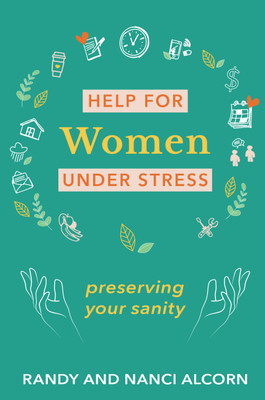One night a man heard a noise nearby and thought there was a burglar in his backyard. The stress was so great he died of a heart attack. Did the burglar cause his stress? No. There was no burglar. What caused his stress—and cost him his life—was not reality but his faulty perception of reality.
With two weddings in the Alcorn family that were planned in one summer, it’s appropriate to tell this story:
Joyce and Bea (not their real names, of course) both had daughters get married in June. Both women were Christians, both loved their girls, both wished them happiness. In fact, the two weddings were very similar. But Joyce and Bea had two very different experiences.
Joyce was a little nervous, naturally, but she was excited, joyful, and festive. This wonderful day in her daughter’s life was also wonderful for her. Not that everything went smoothly—the wedding coordinator was bossy, the photographer was late, the cake was different than she ordered, and the flowers didn’t look quite fresh. When the ring bearer stood on the wrong side of the platform and the groom forgot a line of the vows, Joyce laughed to herself and enjoyed the wedding all the more.
Bea’s daughter was married two weeks later in the same church. The wedding went just as well, perhaps a little better. But Bea was uptight, strung out, and ready to string up the photographer, the florist, and the cake decorator for their inexcusable foul-ups. She cringed when the candlelighters didn’t stay together; she trembled for fear that her husband would blow his one line (“Her mother and I”). Her stomach churned when the best man fumbled for the ring. It may have been the happiest day in someone’s life, but Bea was miserable. Why? Because of her circumstances? No, because of her perspective. Because of her point of view.
Before you write off the difference between Joyce and Bea as “just a difference in personality,” think about it. Bea will never be Joyce and shouldn’t try to be her, but she too can learn to develop a positive perspective on life. Indeed, if she is ever to be content and at peace, Bea must change. Unless she does, the same short-sighted perspective that ruined the wedding for her will inevitably ruin her entire life (not to mention make it unpleasant for everyone around her).
To overcome stress you must either change your circumstances or your perceptions. You can change some circumstances, of course, but many you cannot. The truth is that you have little or no control over the photographer, florist, cake decorator, flower girl, or best man. You can’t make your children get straight As, lower taxes, stop the rain, or cause a cease-fire in the Middle East. You can’t even get the Book of the Month Club to stop sending you books or get your husband to put his dirty clothes in the laundry basket.
So, if you are to have any peace at all, any relief from stress, you must adjust to human problems, errors, weaknesses, accidents, and any number of things that life is certain to bring and which—if you don’t learn to accept them—are certain to drive you nuts.
Perspective
Our perceptions, much more than our circumstances, are the building blocks with which we construct our lives. There is a sense in which we literally create the world we live in. If it is empty, irritating, boring, hectic, or hurried, it is because we have perceived it that way, and—at least in a sense—made it that way. No matter what the circumstances, our view of life determines our level of joy and contentment.
Don’t misunderstand. I am not promoting “positive thinking” for its own sake. I am advocating positive thinking when and only when it is biblical thinking.
I know some very ungodly people who are “positive thinkers.” They have no time for the doctrine of sin and the reality of true moral guilt and human accountability to God. These things are too “negative” for them. Unfortunately for them, unless they accept these basic biblical truths, negative as they might be, all the positive thinking in the universe won’t deliver them from the ultimate negative—hell.
I am also not encouraging something mystical or magical, the way some people view positive thinking. If you wish real hard and real long and real sincerely...you may still not get what you wish for!
Neither am I talking about the philosophy behind many of the success books like Napoleon Hill’s Think and Grow Rich. These books, and the innumerable seminars spun off from them, define success in terms of the accumulation of wealth (as do some “Christian” sales organizations). They quote freely from Christ and Aristotle and Buddha and “other positive thinkers” and refer to God only in the context of how he can make you wealthy (as if that’s his purpose for existing).
All thinking should be rooted in biblical fact. The truth is that in light of Christ’s victory over sin and death and God’s unalterable plan to rule this universe with righteousness, the biblicist is ultimately an optimist. He is not a positive thinker because pop psychology tells him he should be but because over and over again Scripture gives him reason to be.
If God is good and sits on the throne of the universe and everything that comes into your life is Father-filtered...how can you be anything less than optimistic?
The follower of Christ is not a pessimist, nor is he first an optimist. He is first a realist and then an optimist. In other words, the Christian is not optimistic because it is the most advantageous way to think but because it is the accurate way to think. The Christian’s optimism is based squarely on realism: God is real, the atonement is real, the resurrection is real, the second coming is real, God’s providence is real, and the gospel really is “good news.”
Perspective is what Joshua and Caleb had, and the other ten spies didn’t (Numbers 13-14). Joshua and Caleb entered Canaan and saw the land, the fruit, the potential for prosperity, and a place for their families to live and worship God. The other ten spies went to the same land and saw giants—great men of war, who made conquering the land seem impossible. Joshua and Caleb saw exactly the same giants. But somehow, to them, they just didn’t seem so big. The two saw God as bigger than giants. The ten saw giants as bigger than God. Because they saw God on his throne, Joshua and Caleb could look at the same set of circumstances and see a completely different picture than the others saw—a picture both realistic and optimistic.
A Test of Perspective
Our perspective may not be tested in terms of lands and giants and battle strategy. But count on it—it will be tested.
Years ago Nanci and I went on a two-week vacation to California. We left the kids with friends, and took off on what was going to be our greatest vacation ever. We had everything planned, and we so deserved the time off (that’s what we told ourselves). We just knew everything would go perfectly.
Everything did go perfectly—for the first forty miles. Then our radiator blew up. We ended up spending the whole day in a small Oregon town which I won’t name for fear of offending someone, though I doubt anyone from this town would ever come across this story. Suffice it to say, it was not the Magic Kingdom.
We had left with a few hundred dollars in cash, and a little more in traveler’s checks, with one major credit card to use as a back-up. Most of the cash was safely hidden, but I put it in my wallet just for a few minutes in order to pay for the radiator. Then I found out we didn’t have enough cash for the radiator. They wouldn’t take a credit card, so we had to use all but one of our traveler’s checks. An hour or two after sunset, we were on the road again.
We drove all the next day and got in late to Santa Clara, California. We went out for pizza, finally ready to relax for the first time in two days. The next thing we knew my wallet had been stolen. That’s right, the wallet that still had all the cash in it from the day before. It also had the credit card. And, to top it off, it was the Friday night of Memorial Day weekend. No bank would be open until Tuesday, when we had reservations in another part of the state. Meanwhile, we had a grand total of one $20 traveler’s check to get us through the next three and a half days.
The rest of the trip was good news and bad news. The good news was that the sun shone the whole time. The bad news was that Nanci developed an extremely uncomfortable sun rash and couldn’t expose her skin to direct sunlight until we returned home to Oregon (where direct sunlight is rarely a problem). Long sleeves, high necklines, and floppy hats were the only thing that allowed Nanci to escape from the hotel room.
What’s the point of this story? The point is, it turned out to be potentially the worst vacation we’ve ever had. But it turned out actually to be the best vacation we’ve ever had. Why? Perspective.
We cried, we prayed, we laughed, we grew. We counted our blessings and realized how much we had and how little we had lost. Once we let go of our ideal picture-perfect vacation and determined to enjoy whatever God had for us, he gave back to us a wonderful time and more. The circumstances didn’t improve because our attitudes improved. But, by God’s grace, our attitudes completely overwhelmed the circumstances.
As goes your perspective, so goes your vacation, your wedding, your job, your dishes, your ministry, your carpool...your whole life.
“Many are the plans in a man’s heart, but it is the Lord’s purpose that prevails” (Proverbs 18:14). A right attitude carries you through bad circumstances and poor health. But no matter how strong the body, how positive the circumstances, a crushed spirit will never experience joy. Perspective is what makes the spirit soar like an eagle even when the body is ravaged by accident, disease, and age.
What We Believe
Perspective is rooted in belief. We think and act based upon our beliefs. Our belief system is the blueprint around which we build our life and the lens through which we see our life.
This is why exposure to true Bible teaching is so important, and why it’s essential to attend a church that teaches God’s Word and to study it daily ourselves (Acts 17:11). The more our beliefs are established on God’s truth, the better the foundation for our entire life, and the less likely we will collapse under life’s stresses.
When I speak of beliefs, I don’t mean merely what we say we believe but what we really do believe. Most of us say we believe in a sovereign God. Our doctrine is correct, but the true test of our beliefs is when we have a week of rain on our long-awaited camping trip, or the car breaks down on the way to the airport, or the washer—with all of your best delicate clothes in it—is filled with muddy water from a broken water main (this has happened to Nanci). Is God sovereign when he deals with the rise and fall of empires but not when my tent leaks or my favorite shirt is ruined? Is he sovereign just when I get my way, or is he always sovereign? The illustrations I’m using are small things. But the God who’s sovereign in small things also controls the big ones.
Hopefully, your beliefs are rooted in truth. But whether they are or not, they will determine your perspective. Ironically, sometimes non-Christians view life positively when in fact they are hopelessly lost without Christ. On the other hand, Christians who have every reason to be joyous may have very negative attitudes. The person going to hell may be relatively happy, the one going to heaven may be miserable. Both have attitudes based on incorrect beliefs. But whether or not they are correct, beliefs do determine attitudes.
Rejoicing Despite Circumstances
Probably the biggest step in reducing and controlling stress is to realize once and for all that circumstances do not cause stress. It is our interpretation of and response to circumstances that cause stress.
Have you ever read the popular children’s story Alexander and the Terrible, Horrible, No Good, Very Bad Day? Read the story and at first you think Alexander did have an unusual number of terrible things happen to him, so no wonder he had a terrible day. But then you realize that the things that happened to Alexander are the usual kinds of irritations that happen to us all daily. They are simply part of being alive in this far-from-perfect world. It is our loss of perspective that magnifies out of proportion every little thing that goes wrong.
If today was difficult because “it wasn’t a normal day,” ask yourself, “When was the last time I had a normal day?” It was not Alexander’s circumstances but his interpretation of and response to those circumstances that caused his terrible, horrible, no good, very bad day. Same with yours.
Circumstances aren’t what makes a day—or a lifetime—good or bad. What else can explain the fact that many people have beautiful homes, secure jobs, every material possession imaginable, financial security, perfect health, and yet are miserable, even suicidal? And that many others live in poverty, own nothing, have poor health, and yet are filled with the joy of life?
Most people rejoice when their circumstances are good and get depressed when their circumstances are bad. As Christians we are to “rejoice in the Lord always” (Philippians 4:4-6). Do you know what the word translated “always” means in the original Greek? It means always. (That’s why it’s translated that way.) “Always” means we are to rejoice regardless of our circumstances-not because of them.
As Christians we always have reason to rejoice because of truths that are untouched and unchanged by outward circumstances. We are created by God, loved by God, cared for by God whether it rains or shines, whether there’s war or peace. “Jesus Christ is the same yesterday, today, and forever” whether the church splits, the pastor leaves, or there’s a terrible scandal.
Consider Paul and Silas when they were in prison at Philippi. Both men had been severely flogged and their feet were fastened in stocks in what in those days was a disease-ridden, rat-infested cell. How did they respond? “About midnight Paul and Silas were praying and singing hymns to God, and the other prisoners were listening to them” (Acts 16:25). Keep in mind that though Paul and Silas later escaped through divine intervention, at the time they were rejoicing and singing they had no idea they were going to escape. In other words, their spirits were joyful even in the face of further beatings and death.
What would most of us have done in that prison cell? Some of us would mope and grouse and weep and kick the walls and cater our own little pity party. In other words, we would fit right in with the other prisoners. It’s when there’s something different about us, when we are filled with “the peace of God which transcends all understanding” that we draw the attention of discontent searching people in need of Christ.
Your baby is born with Down Syndrome, your family business is lost, your wife leaves, your house is burned to the ground. Am I suggesting these circumstances will not affect you? Of course not. I’m only saying they need not control you. You can rise above them, as Paul and Silas and many others have done, and as people of God are doing right now all over the world. When these things happen to you, the world will watch. And if it sees calm in the midst of storm, it will be drawn to the Christ you love.
Let God Be God
Some years ago Rabbi Harold Kushner wrote the bestseller When Bad Things Happen to Good People. He concluded that since there is so much evil and tragedy and suffering, either God must not be all-good or he must not be all-powerful. Opting for God’s goodness, he decided God is not all-powerful.
The rabbi’s mistake was a familiar one--failure to believe Scripture when it teaches things we do not understand. The truth is that God is all-loving and all-powerful and that there are reasons he allows suffering. We cannot understand all those reasons, though sometimes we catch a glimpse of them. But our lack of understanding does not negate God’s attributes. It only proves what the Bible said all along:
For My thoughts are not your thoughts, neither are your ways My ways,” declares the Lord. As the heavens are higher than the earth, so are My ways higher than your ways and My thoughts than your thoughts (Isaiah 55:8-9).
We need not and must not hedge on one attribute of God in order to preserve another. God cares about the pain and suffering of this world far more than we. One day he will make it all right. Till then we must learn to trust him.
For more, see Randy's blogs related to stress, as well as his book Help for Women Under Stress.
Photo by Evan Kirby on Unsplash





